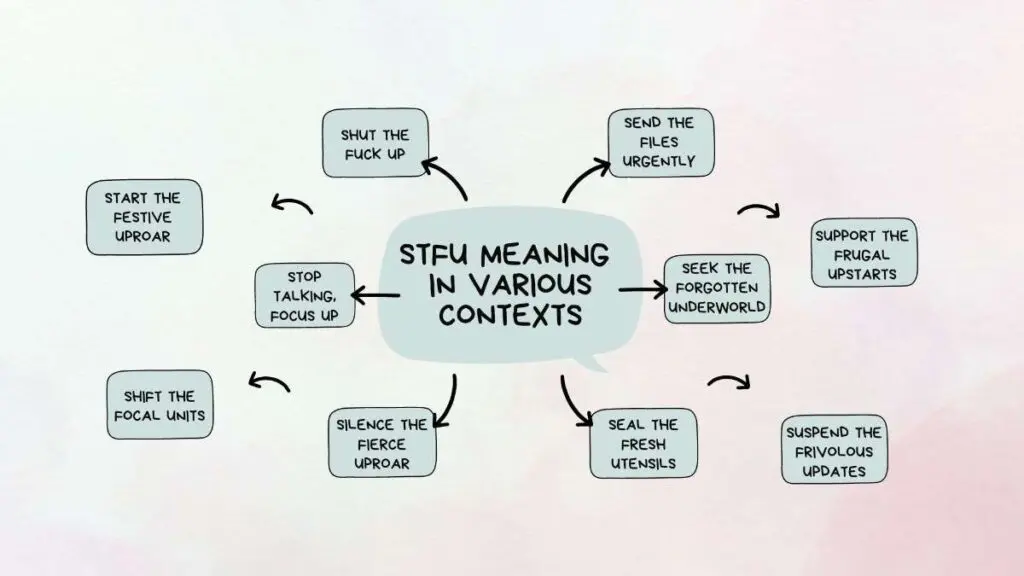Quick Look
- STFU: “Shut The F*** Up”
- Usage: Social Media, Conversations
- Origin: 2000s Internet Slang
- Similar: GTFO, WTF, WTH
- Represents: Annoyance, Dismissal
Tired of endless talking? Or maybe you saw the acronym “STFU” and wondered what it means? You’re in the right place. STFU is a straightforward term. It’s used online to quickly tell someone to stop talking. But there’s more to it than just that.
In this post, we’ll explore what STFU means, when to use it, and when not to. We’ll also look at how it affects online communication. So, whether you’re familiar with internet slang or just curious, let’s uncover the meaning behind this controversial acronym.
Outline
ToggleWhat Does STFU Mean?
“STFU” stands for “Shut The Fuck Up.” It is used to express frustration or anger, often telling someone bluntly to stop talking. This phrase can be offensive and is typically considered inappropriate in formal or polite conversation. However, it has found a place in casual exchanges, particularly among friends or in situations where strong emotions are involved.
STFU is often deployed in online discussions and text messages as a direct response to statements perceived as annoying, repetitive, or offensive. It’s a quick way to assert one’s displeasure with the conversation without elaborating on the reasons. Despite its harshness, in some circles, STFU is used humorously or affectionately, depending on the relationship between the individuals involved and the context.
Where Did STFU Come From? The Origin

The acronym “STFU” originated in the early days of internet chat rooms and online gaming communities. It became a quick way to express a strong command for someone to stop speaking, usually due to frustration or to assert dominance in a conversation. The phrase “Shut the fuck up” itself has been in use for decades, but its abbreviation to STFU became popular as internet culture evolved to favor quick, concise communication.
STFU spread widely with the rise of instant messaging platforms and social media, where speed and brevity are prized. The anonymity and distance provided by the internet also make it easier for users to use such blunt language without the immediate social repercussions that might occur in face-to-face interactions.
Alternate Meanings of STFU
While STFU is widely recognized as an abbreviation for “Shut The Fuck Up,” it can occasionally take on different meanings in less common contexts. For example, in a more playful or ironic sense, some might use STFU to mean “Save The Freaking Unicorns,” highlighting a stark contrast to its usual connotation. Such alternate uses are typically context-specific and are often created to add humor or light-heartedness to a conversation.
These variations are generally understood through the context of the conversation or the relationship between the participants. It’s important to gauge the tone and setting before using or interpreting STFU in a non-standard way to avoid miscommunications.
Other Related STFU Acronyms
In addition to STFU, there are several related acronyms that share a similar tone or function in digital communication. Examples include LOL (Laugh Out Loud), OMG (Oh My God), and WTF (What The Fuck), which are used to express a range of emotions from amusement to disbelief. These acronyms, like STFU, are part of a broader lexicon of internet slang that facilitates quick and expressive communication in informal settings.
Another closely related acronym is LMAO (Laughing My Ass Off), which, like STFU, can convey a strong reaction but in a more humorous rather than commanding tone. These acronyms are often used together in various combinations to enhance the expressiveness of digital communications, especially in casual conversations among younger internet users.

Creative And Playful Alternatives To STFU
- Save The Friendly Unicorns
- Send The Files Urgently
- Stop Talking, Focus Up
- Seal The Fresh Utensils
- Sell The Funky Umbrellas
- Solve The Formula Underneath
- Secure The Future University
- Start The Festive Uproar
- Seek The Forgotten Underworld
- Support The Frugal Upstarts
- Silence The Fierce Uproar
- Sail Towards Fairer Usages
- Shift The Focal Units
- Study The Formal Usages
- Suspend The Frivolous Updates
Who Uses STFU And Where?
STFU is predominantly used among younger demographics, particularly those who are active on social media platforms and online gaming communities. It’s common in environments where informal, brisk communication is the norm. Among friends or in settings where people share a close bond, the term might be used in jest or as a playful jab.
However, its use isn’t limited to casual settings. STFU can appear in heated debates or discussions online where emotions run high. In these contexts, it is often employed to abruptly silence someone, reflecting annoyance or anger. While widely used, it’s important to note that STFU can be seen as disrespectful and could escalate conflicts if used inappropriately.
Here Are Some Of The Main Platforms Where STFU Is Frequently Employed
- Social Media Platforms:
- Facebook: Often seen in the comments section of posts or in personal messages.
- Instagram: Used in comments or direct messages, especially in heated discussions.
- TikTok: Appears in comments under videos, especially those that are controversial or generate strong opinions.
- Twitter: Used in tweets or replies when users express frustration or want to abruptly end a discussion.
- Messaging Platforms:
- WhatsApp: Common in personal chats or group messages among friends.
- Snapchat: Used in snaps or chats, especially among close friends.
- Discord: Frequently appears in gaming communities or among groups that discuss various topics informally.
- Online Gaming:
- Various online gaming platforms and live streaming services like Twitch often see the use of STFU during gameplay, where emotions and competitiveness can run high.
How to Use STFU? (With Examples)
Using STFU correctly involves understanding both the context and the relationship between the communicators. Here are some examples and dialogues that illustrate appropriate uses of STFU:
- Between Friends:
- Person A: “I can’t believe you ate the last slice of pizza!”
- Person B: “STFU, you had like five already!”
- In Online Gaming:
- Gamer 1: “You totally missed that shot!”
- Gamer 2: “Dude, STFU, I’m doing my best.”
- During a Heated Argument:
- Person A: “You’re not making any sense right now.”
- Person B: “Just STFU and listen for a second!”
- In a Humorous Exchange:
- Person A: “I’m going to start working out tomorrow.”
- Person B: “STFU, you said that last week too!”
- When Someone Reveals a Spoiler:
- Movie Watcher 1: “Did you know the hero dies at the end?”
- Movie Watcher 2: “STFU, I haven’t seen it yet!”
In each of these scenarios, STFU serves to express frustration or disbelief, but the degree of seriousness can vary greatly. It’s essential to gauge the tone of the conversation and the familiarity between participants to avoid misunderstandings.
How To Reply To STFU (With Examples)
Responding to STFU can be tricky, depending on the context and the relationship between the parties involved. Here are examples of how one might appropriately reply:
- With Humor:
- Person A: “STFU!”
- Person B: “Make me!”
- With Dismissal:
- Person A: “STFU!”
- Person B: “Wow, someone’s cranky.”
- With Calmness:
- Person A: “STFU!”
- Person B: “I understand you’re upset, but let’s keep this civil.”
- With Surprise:
- Person A: “STFU!”
- Person B: “That was uncalled for.”
- With Ignorance:
- Person A: “STFU!”
- Person B: (ignores the comment and changes the topic)
Facts About STFU
STFU, while colloquial and often seen as rude, holds a variety of interesting facts that reflect its role in language and culture:
- Global Usage: Despite its origins in English-speaking internet culture, STFU has been adopted by non-English speakers in online interactions, showing the global influence of internet slang.
- Variability In Perception: The perception of STFU can vary dramatically between cultures and even among different social groups within the same culture. What is considered playful in one circle might be seen as outright rude in another.
- Legal And Workplace Relevance: There have been instances where the use of STFU in workplace emails or communications has been brought up in legal contexts, often related to harassment or workplace decorum.
- Linguistic Studies: Academics have studied STFU as part of broader research into the evolution of language in the digital age, noting how acronyms and shortened forms of communication affect modern language.
- Media References: STFU has appeared in various forms of media, including films, television shows, and music, often highlighting its impact on popular culture.
Other Common Abbreviations Parents Should Know
- LOL – Laugh Out Loud: Indicates amusement.
- BRB – Be Right Back: Used when stepping away from a conversation.
- OMG – Oh My God: An expression of surprise or excitement.
- TTYL – Talk To You Later: Used to end a conversation with the intention to resume later.
- IDK – I Don’t Know: A straightforward expression of uncertainty.
- SMH – Shaking My Head: Indicates disbelief or disappointment.
- WTF – What The Fuck: Similar to STFU in its crudeness, often used to express disbelief or anger.
- TBH – To Be Honest: Prefaces a sincere or blunt statement.
- BFF – Best Friends Forever: Indicates a very close friendship.
- FOMO – Fear Of Missing Out: Describes anxiety over missing a fun or important event.
FAQs:
Not always; its offensiveness depends on the context and the relationship between the people involved.
Generally, no. STFU is considered inappropriate for professional environments due to its offensive nature.
Open communication about the appropriateness and potential impact of such language is essential.
Yes, among close friends or in humorous contexts, it can be used playfully without causing offense.
Address the issue directly with the person involved, expressing how the language affected them.
It is less common, as older adults may not be as immersed in the slang of digital communication.
It has become more widespread with the growth of digital communication, though its core meaning remains the same.
Yes, cultural contexts greatly influence how such expressions are perceived and used.
Yes, using harsh language like STFU can strain or break digital communications if not used carefully.
Phrases like “Please be quiet” or “Let’s change the subject” can convey similar messages more politely.
Conclusion
In conclusion, STFU is widely used across various digital platforms, from social media to messaging apps and online gaming. While it can convey strong emotions or humor among friends, it’s crucial to understand the context and potential impact of its use to maintain respectful and effective communication online.

